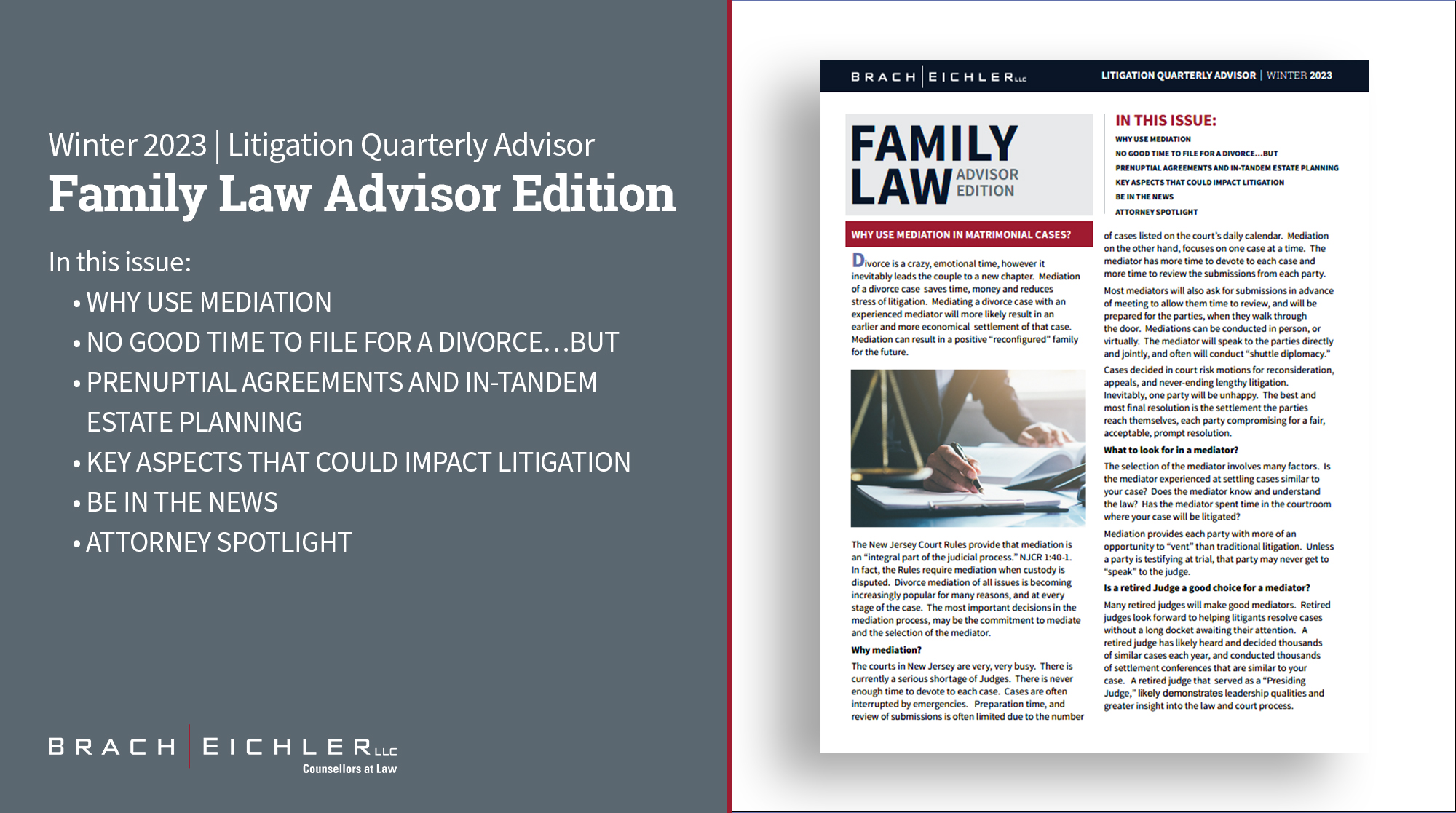

Divorce is a crazy, emotional time, however it inevitably leads the couple to a new chapter. Mediation of a divorce case saves time, money and reduces stress of litigation. Mediating a divorce case with an experienced mediator will more likely result in an earlier and more economical settlement of that case. Mediation can result in a positive “reconfigured” family for the future.

The New Jersey Court Rules provide that mediation is an “integral part of the judicial process.” NJCR 1:40-1. In fact, the Rules require mediation when custody is disputed. Divorce mediation of all issues is becoming increasingly popular for many reasons, and at every stage of the case. The most important decisions in the mediation process, may be the commitment to mediate and the selection of the mediator.
Why mediation?
The courts in New Jersey are very, very busy. There is currently a serious shortage of Judges. There is never enough time to devote to each case. Cases are often interrupted by emergencies. Preparation time, and review of submissions is often limited due to the number
of cases listed on the court’s daily calendar. Mediation on the other hand, focuses on one case at a time. The mediator has more time to devote to each case and more time to review the submissions from each party.
Most mediators will also ask for submissions in advance of meeting to allow them time to review, and will be prepared for the parties, when they walk through the door. Mediations can be conducted in person, or virtually. The mediator will speak to the parties directly and jointly, and often will conduct “shuttle diplomacy.”
Cases decided in court risk motions for reconsideration, appeals, and never-ending lengthy litigation. Inevitably, one party will be unhappy. The best and most final resolution is the settlement the parties reach themselves, each party compromising for a fair, acceptable, prompt resolution.
What to look for in a mediator?
The selection of the mediator involves many factors. Is the mediator experienced at settling cases similar to your case? Does the mediator know and understand the law? Has the mediator spent time in the courtroom where your case will be litigated?
Mediation provides each party with more of an opportunity to “vent” than traditional litigation. Unless a party is testifying at trial, that party may never get to “speak” to the judge.
Is a retired Judge a good choice for a mediator?
Many retired judges will make good mediators. Retired judges look forward to helping litigants resolve cases without a long docket awaiting their attention. A retired judge has likely heard and decided thousands of similar cases each year, and conducted thousands of settlement conferences that are similar to your case. A retired judge that served as a “Presiding Judge,” likely demonstrates leadership qualities and greater insight into the law and court process.

In the end select an experienced mediator who has a depth of knowledge and experience, who will have insight into the dispute resolution process.
How can you prepare for mediation?
Both parties should be ready to compromise.
Provide all documents to the mediator in advance of mediation, such as financial information, recent tax returns, w-2 forms and all relevant information. In New Jersey, the parties are required to complete “case information statements” which is a budget of expenses, and list of liabilities and assets.
Consequently, attend mediation with a proposal for settlement. This should be shared with the mediator in advance of meeting. If custody and parenting time is an issue, exchange proposals and provide those to the mediator as well. Finally, you should be prepared to draft a “Marital Settlement Agreement” which will be necessary to be divorced.
Mediation can be conducted at any time in the divorce process. If the mediation is successful the parties can promptly file in court and obtain a date for an “uncontested divorce.” But each party should consider consulting their own attorney before the final divorce is entered in court.
Mediation is a better venue than court to obtain a settlement. Hopefully after mediation, each party will feel they have been “heard.”
If properly mediated and resolved, divorce can be the start of the next chapter, a “reconfigured” family, or a more positive relationship between the parties going forward.
For more information, contact:
Judge Lisa Chrystal (Ret.) | 973.364.8359 | lchrystal@bracheichler.com
Same-sex couples have faced barriers in expanding their families and have long fought to obtain equal adoption rights. The first known adoption case involving a same-sex couple in the United States did not take place until 1970 and the first same-sex female couple adoption, which occurred in California, was not until 1986. Since the first legal adoption, there is no debate that biomedical reproductive technology has progressed rapidly, aiding many same-sex couples in starting a family. In recognition of those advancements and the outdated legal limits placed on same-sex couples’ ability to start a family, the New Jersey legislature enacted the Legal Parentage Act (N.J.S.A. 9:17-69 to -71) in April of 2020. The Legal Parentage Act amended the law governing the adoption of children to permit civil union partners or legal parents of a child, when those persons are named as parents on the child’s birth certificate, to obtain a judgment of adoption in lieu of pursuing a confirmatory co-parent adoption.
For married heterosexual couples, there is a presumption of paternity for the husband under N.J.S.A. 9:17-43. However, that same presumption does not exist for same-sex couples. If a child is born to one parent of a same-sex relationship, the same-sex parents may, in New Jersey, put both parents names on the child’s birth certificate, however, that does not obviate the need for adoption to confer legal parentage.
Prior to the enactment of the Legal Parentage Act, same-sex couples had to undergo a lengthy and expensive process to adopt, even if both parents were listed on the child’s birth certificate. The adoption process required background checks including: (l) Criminal History Record Information (“CHRI”) fingerprint background checks; (2) Division of Child Protection and Permanency system name checks, now referred to as Child Abuse Records Information (“CARI”) and (3) Domestic Violence Registry checks. As a result of the enactment of the Legal Parentage Act, courts are required to waive those background checks.
The Legal Parentage Act has streamlined the adoption process for New Jersey same-sex couples and facilitates a less cumbersome procedure for establishing the legal parentage of non-biological parents. Under the Legal Parentage Act, specifically N.J.S.A. 9:17-71(b), to qualify for a co-parent adoption, petitioners must

attach the following to the adoption complaint: (l) proof of a valid civil union or marriage between the natural or legal parent and that person’s partner in civil union or spouse, issued prior to the birth of the child; (2) an original birth certificate issued by the State Registrar of Vital Statistics on which both partners in civil union or spouses are listed as parents of the child; and (3) a written declaration signed by both parties to the action that describes in sufficient detail how the child was conceived and identifies any other involved parties so that the court may determine whether those individuals have parental rights to the child.
Once the court finds that the petitioners have satisfied these three requirements, the Family Part will issue a Judgment of Adoption naming both petitioners as the legal parents of the adopted child, without need for a court appearance by the parties. An in-court appearance is only required if the Court determines that another individual may have existing parental rights to the child, then the Court must order and conduct a hearing on the matter, providing notice to all parties, before issuing a Judgment of Adoption. However, no notice is required to any person who may be a donor. Furthermore, the Legal Parentage Act, specifically N.J.S.A. 9:17-44(b), provides that unless the donor and the natural mother enter into a contract establishing the donor as a parent of the child, the donor is not treated as a father and shall have no rights or duties stemming from the conception of the child. Notably, the Legal Parentage Act is not applicable for same-sex couples who have used known sperm donors and not legally terminated the donor’s rights in the state of conception. This law also does not apply to same-sex couples without legal recognition of their partnership.
Same-sex couples have faced a long and winding road to family equality. While New Jersey has a history of promoting acceptance and expansion of same-sex couples’ rights, not every state has similar legislative
policies. In many states, simply having both same-sex parents on a child’s birth certification, even if the parties are married or in a civil union, is not enough to ensure the non-biological parent’s legal parentage. For those same sex-couples that the Legal Parentage Act applies to, establishing legal parentage for the non-biological parent through this simplified process, which has curtailed the lengthy and costly process, removed background checks, and eliminated court appearance(s), is advisable to ensure his or her parental rights are recognized, especially if the family decides to move or travel outside of the state of New Jersey.
For more information, contact:
Kristen E. Marinaccio | 973.403.3138 | kmarinaccio@bracheichler.com
“When should I file my complaint for divorce?” This is one of the most common questions asked of all matrimonial practitioners. The answer is almost always the same – “When you are ready.” However, from a legal standpoint, the answer is almost always the same – “It depends.”
From a judicial perspective the filing date is largely irrelevant in establishing support obligations as there are many statutory factors that govern these calculations and determinations. The filing date will have a more definite impact on the distribution of assets/liabilities as it will act as the legal cutoff date for the marriage and starting the calendaring clock within the judicial system. While this date will not necessarily be determinative as to the amounts to be distributed, it will act as a guidepost for valuations and help identify those assets that are marital.
While that guidepost is something to consider, there are some more important practical questions and concepts that people should think about when considering filing for divorce – Is there a tax reason to file immediately? Are you or your spouse going to receive an inheritance that will be used to fund marital expenses? Do you own your own business or does your spouse own their own business? Does the business expect to have any substantial revenue growth or loss in the coming year? Is filing a joint tax return important to you? What is most practical for you and your family and your children? Can your family afford two households? Can you and your spouse remain under the same roof and behave civilly towards one another?
In answering those questions, consider that the filing of a divorce complaint (and certainly entering a judgment for divorce terminating a marriage) will have tax implications for a family, including but not limited to being eligible for head of household or whether to file upcoming tax returns jointly or separately. Also, if you are receiving an inheritance, there are several tax issues that will need to be discussed with your professionals as you consider filing a divorce complaint. By filing early in a year, a spouse may also gain the necessary time to file as head of household or single for the upcoming tax year.
We currently live in a world with an uncertain job market, rising interest rates and volatile financial markets. Filing a complaint sooner rather than later may allow a party to rely upon higher current financial circumstances as well as those you anticipate in the coming months. The filing may also allow you to create some level of certainty as to the family’s income levels and assets and, perhaps, minimize the impact of some of the volatility in the world. Or, if you are a business owner with expected drops in revenue, a delay in filing may allow you to have a lower business valuation or support obligations because of an involuntary drop in income.
From a practical standpoint, by delaying the filing of a complaint until after the holidays, a family may find a benefit by avoiding some of the emotional confusion associated with the Complaint’s filing during a time when families get together. While this delay will be short lived, the short delay can remove some of the sting of the filing. In addition, by filing in the first quarter, a family will also provide themselves with sufficient time to establish separate living arrangements and work towards a custody arrangement for any school aged children. This extra time will provide the ability to establish separate households well in advance of the following school year and avoid the unnecessary stress of rushing to do so late in the summer.
In sum, while filing in the first quarter of a given year may provide a family with certain benefits, these benefits should not outweigh the most important consideration for an individual. That is, are you ready to file a Complaint which will end a marriage? Until you can answer that question in the affirmative, it is most definitely the wrong time to file a Complaint for Divorce.
For more information, contact:
Sean Smith | 973.364.5216 | ssmith@bracheichler.com

For parties looking to tie the knot a second time, especially those 55 and older who make up 50% of the Americans who remarry, they may be coming into the union with prior children, established careers, and likely far more complicated finances and assets than those entering their first marriage. There is significant value for those establishing blended second-marriage families to consider how to adequately provide for both a new spouse and a party’s children from a prior relationship.
Many think of prenuptial agreements solely as legal instruments that protect against the possibility of a future divorce. However, prenuptial agreements can also be a critical estate planning tool when used in conjunction and properly coordinated with wills or trusts to assure that assets are passed on in the desired intention of a party.
There are many estate planning concerns that arise in second marriages, many of which will be fact-sensitive to the specific parties, their prior families, their assets and lifestyle. However, included below are a few common issues and tips which demonstrate the utility of a prenuptial agreement in tandem with estate planning:
Specify how separate property will be used during the marriage, if one party predeceases the other.
The owner of the separate property residence which is then used as a marital residence, may want to leave the home, upon his or her death to his children from a prior marriage. However, that could leave the surviving spouse without a place to reside, depending on the children’s intentions with the home. If the
owner leaves that same residence to his or her surviving spouse, the surviving spouse has the ability to leave the residence to whomever he or she designates, which may not necessarily be the owner’s children from the prior marriage. If the owner wants to ensure that the surviving spouse can live in the residence and the expenses are paid for, but leave the asset to his or her children, he or she can memorialize this intention in a prenuptial agreement. To carry out that intent the owner should set up an Irrevocable Life Insurance Trust (ILIT) enabling the surviving spouse to continue to live in the residence for his or her lifetime with the remaining interest, i.e., the property itself, passing to the children or other named beneficiaries.
Review and designate beneficiary designations on retirement accounts.
A judgment of divorce, from a party’s prior marriage, does not void beneficiary designations. The first step is for parties to ensure their prior spouses are not still listed as beneficiaries. Thereafter, a prenuptial agreement should be the next step in expressing the specific intent of the parties regarding the beneficiary designations of their retirement assets. Parties should be careful in naming beneficiaries and understanding how the designations will play out in the future. For example, naming a new spouse as the primary beneficiary and a party’s children from a prior marriage as the secondary beneficiaries may not guarantee that the children inherit the retirement asset. The new spouse, as the primary beneficiary, has the ability to withdraw the entirety of the asset or if it is an IRA, roll over the balance to another IRA, which the children would not be a beneficiary to.
Utilize trusts as an asset protection instrument.
Revocable and irrevocable trusts, which can own almost any type of asset, are useful asset protection instruments for parties entering into a second marriage. They can be contracted for in a prenuptial agreement as a way for parties to keep the assets they each brought into the marriage separate and ensure those assets are left to a party’s children from a prior marriage or other intended beneficiary. Certain irrevocable trusts, such as a Qualified Terminable Interest Property Trust (QTIP), allow a party to leave the income derived from an asset to the surviving spouse during his or her lifetime and the asset itself to be inherited by a designated beneficiary, such as the grantor’s children from a prior marriage. A key benefit of a QTIP Trust is that the assets are protected from the surviving spouse’s creditors, ensuring
that third-party creditors will not seize the asset effectively disinheriting his or her children. Parties entering a second marriage should thoughtfully consider their intentions — not only with respect to their new union but also, each parties’ estate. Each blended family will have specific circumstances and needs, which can be carefully planned for beginning with a prenuptial agreement and in-tandem estate planning.
For more information, contact:
Kristen E. Marinaccio | 973.403.3138 | kmarinaccio@bracheichler.com
You have just learned that your spouse has filed for divorce, or you have decided that you want a divorce and are ready to file a complaint for divorce. You have spoken to friends, family members, perhaps your therapist, co-workers or just about anyone that will listen. You have been given advice, you have been told stories about others’ divorces and you have accessed the numerous articles and blogs regarding divorcing your spouse. You think you are ready. This article addresses key aspects that could impact your divorce litigation.

advice. For example, if you need to value your spouse’s interest in a closely held business consider a joint expert or if not possible set reasonable restrictions on the experts to get the job done and within a reasonable time and amount for their services.
For more information, contact:
Carl Soranno | 973.403.3127 | csoranno@bracheichler.com
WINS AND SIGNIFICANT BRACH EICHLER LITIGATION DEVELOPMENTS
A big win for Colleen Buontempo in CURE v. Hudson Regional Hospital! In CURE v. Hudson Regional Hospital, et al. MER-L-1110-22, CURE filed an Order to Show Cause in attempt to reverse an arbitration award. They argued that the DRP committed prejudicial error by determining the treating provider had overcome a MRO report which, by the administrative code, is given the presumption of correctness. Further, CURE argued that the DRP had inappropriately calculated the usual, customary and reasonableness (UCR) standard in deciphering payments to the providers. The Court agreed by denying CURE’s action and enforced the underlying arbitration.
Riza Dagli and Autumn McCourt win $2.4M trial verdict in commercial dispute. In the case USI Inc. v Festo Didactic Inc., Brach Eichler filed suit in federal court in the District of New Jersey on behalf of plaintiff USI Inc. against educational equipment manufacturer Festo Didactic Inc. In 2012, USI Inc. acted as an intermediary between Festo Didactic’s predecessor Lab-Volt Inc. and the Government of Oman in a construction project for the Military Technological College in Muscat, Oman, funded by the United States Government. In 2014, a contract valued at over $11M was signed between Festo Didactic and the US Government. The construction of the college has long been completed, but Festo Didactic, Inc., failed to compensate USI, Inc. At trial, Dagli and McCourt used multiple witnesses, both in the US and internationally, civilian and military, and almost 300 trial exhibits, to prove that USI was entitled to compensation under both a breach of contract claim and an unjust enrichment claim. Judge Michael Shipp found that plaintiff proved all counts, and held that USI Inc. was entitled to 25% of all equipment sale, and also pre-judgment interest going back to 2015, when Festo Didactic was paid by the US Government.
Anthony Rainone and Eric Magnelli obtained summary judgment dismissing in their entirety federal claims by the NJBLS Benefit Funds seeking over $230,000 in alleged unpaid union benefit contributions.

Brach Eichler is pleased to welcome Member Richard B. Robins, to our Healthcare Litigation Practice.
On January 23, Litigation Member Rose Suriano, issued a client alert discussing “Pay-if-Paid Clauses in a Construction Contract: Has the New Jersey Appellate Court Recently Deemed Them Enforceable?”
On January 17, Carl Soranno and Kristen Marinaccio bylined an article for The New Jersey Law Journal “Federal Reserve Policy, Skyrocketing Interest Rates and Prospects of Recession: The Impact on the Valuation of a Closely Held Business.”
On January 13, a team of Brach Eichler attorneys and paralegals volunteered at 420NJEvents’ Expungement Clinic and provided pro-bono legal services to assist with the expungement process for non-violent cannabis convictions. NJPix11 interviewed Riza Daglia, to discuss how the “NJ marijuana ‘expungement clinic’ seeks to right old wrongs.”
On January 5, The New Jersey Law Journal announced that Hon. Lisa F. Chrystal (Ret.) launched her Alternative Dispute Resolution practice at Brach Eichler in “On the Move.”
On January 1, the following Litigation attorneys were promoted to Members! Congratulations to Alex Capozzi, Shannon Carroll, Eric Magnelli and Jay Sabin.
On December 9th, Keith J. Roberts and Colleen Buontempo, hosted a New Jersey State Bar CLE webcast entitled “2022 PIP No Fault College.”
Join us for the 12th Annual New Jersey Healthcare Market Review, September 28-29, 2023 at the Borgata Hotel Casino & Spa, Atlantic City, NJ! Connect with over 200 attendees comprised of hospital and ASC executives and stakeholders, physicians, practice owners/managers, and healthcare administrators. During this two-day event, industry experts will discuss timely topics and trends in the healthcare and legal space ranging from legislative issues to operating and business strategies for greater profitability. To learn more and register, please visit www.njhmr.com. For questions or additional information, please reach out to Ilana Schackman at ischackman@bracheichler.com.
Get to know the faces and stories of the people behind the articles in each issue. This month, we invite you to meet Member Carl Sorrano and Associate Kristen Marinaccio.
 CARL J. SORANNO
CARL J. SORANNO
As Chair of Brach Eichler’s Family Law Services Practice, Carl J Soranno, blends his deep knowledge of the legal issues affecting the family, along with his background in business and finance, to provide family clients with broad experience and representation. Carl is well positioned to represent high-net-worth individuals in contested and uncontested divorce actions, which include issues related to complex property division, valuation of closely held businesses, executive compensation packages, alimony, and tax-related matters. His practice includes the successful litigation or dispute resolution of cases concerning custody, parenting time, relocation, distribution of pension and retirement plans, stock options and compensation grants, trusts, limited partnerships, closely held corporate interests, and valuation of businesses. Carl is an avid artist, enjoys golf, scuba diving and other active sports and collecting art and antiques. Carl also enjoys making homemade wine with his family.
 KRISTEN E. MARINACCIO
KRISTEN E. MARINACCIO
Kristen E. Marinaccio is an Associate in Brach Eichler’s Family Law Group. Kristen concentrates her practice in matrimonial and family law including divorce, custody and parenting time disputes, alimony and child support, enforcement or modification of support, equitable distribution of assets, premarital agreements, adoption, and appellate practice. In her spare time, Kristen enjoys going to concerts and spending time outdoors, skiing and fly fishing.

Attorney Advertising: This publication is designed to provide Brach Eichler LLC clients and
contacts with information they can use to more effectively manage their businesses. The contents
of this publication are for informational purposes only. Neither this publication nor the lawyers who
authored it are rendering legal or other professional advice or opinions on specific facts or matters.
Brach Eichler LLC assumes no liability in connection with the use of this publication.

Matthew M. Collins | 973.403.3151 | mcollins@bracheichler.com
Riza I. Dagli | 973.403.3103 | rdagli@bracheichler.com
Charles X. Gormally | 973.403.3111 | cgormally@bracheichler.com
Bob Kasolas | 973.403.3139 | bkasolas@bracheichler.com
Thomas Kamvosoulis | 973.403.3130 | tkamvosoulis@bracheichler.com
Eric Magnelli | 973.403.3110 | emagnelli@bracheichler.com
Anthony M. Rainone | 973.364.8372 | arainone@bracheichler.com
Richard B. Robins | 973.447.9663 | rrobins@bracheichler.com
Sean Alden Smith | 973.364.5216 | ssmith@bracheichler.com
Carl J. Soranno | 973.403.3127 | csoranno@bracheichler.com
Frances B. Stella | 973.403.3149 | fstella@bracheichler.com
Rose Suriano | 973.403.3129 | rsuriano@bracheichler.com
Hon. Lisa F. Chrystal, P.J.F.P.(Ret.) | 973.364.8359 | lchrystal@bracheichler.com
Anthony M. Juliano | 973.403.3154 | ajuliano@bracheichler.com
Theodore J. McEvoy | 973.364.5209 | tmcevoy@bracheichler.com
Thomas J. Spies | 973.364.5235 | tspies@bracheichler.com
Eric J. Boden | 973.403.3101 | eboden@bracheichler.com
Lindsay P. Cambron | 973.364.5232 | lcambron@bracheichler.com
Mark E. Critchley | 973.364.8339 | mcritchley@bracheichler.com
Paul J. DeMartino, Jr. | 973.364.5228 | pdemartino@bracheichler.com
Joseph D. Fanning | 973.364.8365 | jfanning@bracheichler.com
Emily J. Harris | 973.364.5205 | eharris@bracheichler.com
Kristen E. Marinaccio | 973.403.3138 | kmarinaccio@bracheichler.com
Michael A. Rienzi | 973.364.5226 | mrienzi@bracheichler.com
Kelley M. Rutkowski | 973.364.5215 | krutkowski@bracheichler.com
Arnold G. Sooklall | 973.364.5223 | asooklall@bracheichler.com
Michael A. Spizzuco, Jr. | 973.364.8342 | mspizzuco@bracheichler.com
Lauren Adornetto Woods | 973.364.5211 | lwoods@bracheichler.com
Roseland, NJ | New York, NY | West Palm Beach, FL | www.bracheichler.com | 973.228.5700



